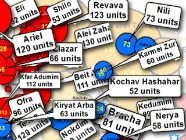Americans for Peace Now (January 2013)
Report by Peace Now detailing the record of Prime Minister Netanyahu's government on settlements from April 2009 to
the present. The report is based on official Israel government statistics, reports, and Peace Now field research.
PDF
>
 The Israeli Peace Now movement (Shalom Achshav) today released an explosive report detailing the
record of Prime Minister Netanyahu's government on settlements over the course of its full term in office (April
2009-present). The report, based on official Israel government statistics, reports, and Peace Now field
research, documents how over the past four years, the Netanyahu government has used settlements as a tool to
systematically undermine the chances of achieving a viable, realistic two-state solution to the
Israeli-Palestinian conflict, despite Netanyahu's rhetorical embrace of such a goal.
The Israeli Peace Now movement (Shalom Achshav) today released an explosive report detailing the
record of Prime Minister Netanyahu's government on settlements over the course of its full term in office (April
2009-present). The report, based on official Israel government statistics, reports, and Peace Now field
research, documents how over the past four years, the Netanyahu government has used settlements as a tool to
systematically undermine the chances of achieving a viable, realistic two-state solution to the
Israeli-Palestinian conflict, despite Netanyahu's rhetorical embrace of such a goal.
The full report is available in English, here.
Shaul Arieli (2013)
Outlines the issue of Jerusalem in the Israeli-Palestinian conflict, including historical background, past
negotiating proposals, and the consequences of existing demographic trends if a peace agreement is not achieved.
(5:12) Watch >
Theodore Sasson / NYU Press (2013)
Book Review (Publishers Weekly) | CampusBooks
Daniel C. Kurtzer, Scott B. Lasensky, William B. Quandt, Steven L. Spiegel, and Shibley Z. Telhami / Cornell
University Press (2013)
Book Review (Foreign Affairs) | CampusBooks
Palestinian Center for Policy and Survey Research (January - June, 2003)
Contains findings of two polls: "Positions of the Israeli Public Regarding a Possible Peace Agreement" by Machon
Dahaf, and "Public Poll Findings on Peace with the Palestinians." The polls demonstrate that roughly two-thirds of
respondents (67%) support a two-state solution based on the 1967 borders, with land swaps; a demilitarized
Palestine; and Jerusalem's Old City administered jointly by the United States, Israel, and the Palestinians, with
Israel maintaining control of the Western Wall. Read More >
Israeli Peace Initiative / Al-Monitor (2013)
Includes results of a poll showing that 55% of the Israelis interviewed would support the Arab Peace Initiative to
at least some degree. Only 27% ''strongly oppose'' the initiative, while 17.5% of them answered ''don't know".
Read More >
B'Tselem (2005 - 2013)
Video footage collected by volunteers as part of B'Tselem's camera distribution project. The organization
distributes video cameras and provides training to Palestinians living in areas in the West Bank, East Jerusalem
and the Gaza Strip where tensions are high and clashes are commonplace. Watch >
The S. Daniel Abraham Center for Middle East Peace (2012)
Ha'aretz article on two opinion surveys conducted by different Israeli pollsters that show most Likud-Beiteinu and
Habayit Hayehudi voters would support a peace agreement establishing a demilitarized Palestinian state based on the
1967 borders, Israel's retention of major settlement blocs and a division of Jerusalem. The two polls also revealed
that two thirds of all Israelis support such an agreement.
Read More >
What is a settlement?
"Settlement" is the term used to denote Israeli civilian communities built in territory conquered by Israel in the Six Day War (June 1967). This territory is comprised of the West Bank (including East Jerusalem), the Gaza Strip, the Golan Heights and the Sinai Peninsula. These neighborhoods have been a major issue in the peace process since 1967 and remain highly controversial.
Settlements in the Sinai were evacuated and destroyed in 1979, following Israel's historic peace agreement with Egypt and the return of the Sinai Peninsula to Egypt.
Settlements in the Gaza Strip were evacuated and destroyed as part of Israel's unilateral "disengagement" from Gaza in 2005.
Therefore, today settlements only exist in the Golan Heights and the West Bank (including East Jerusalem).